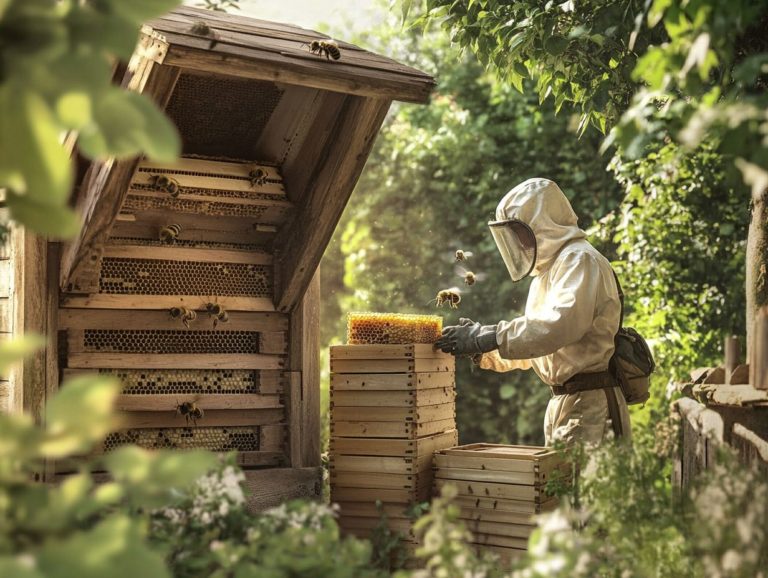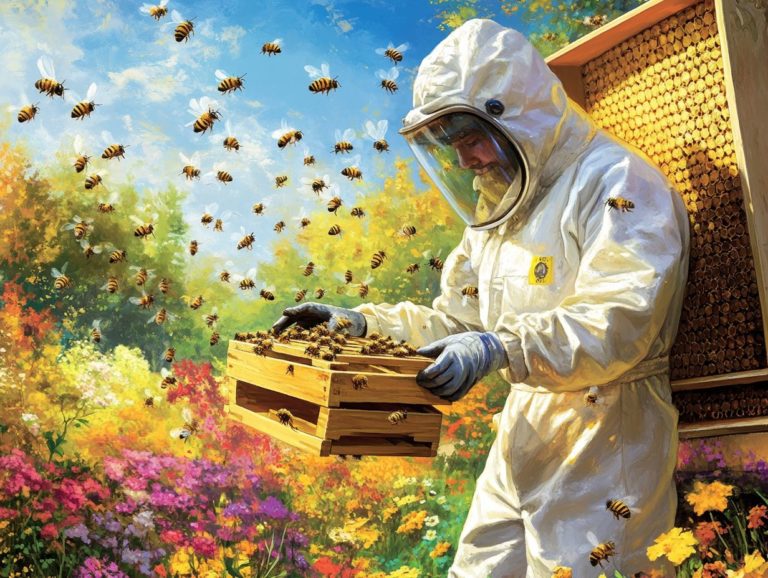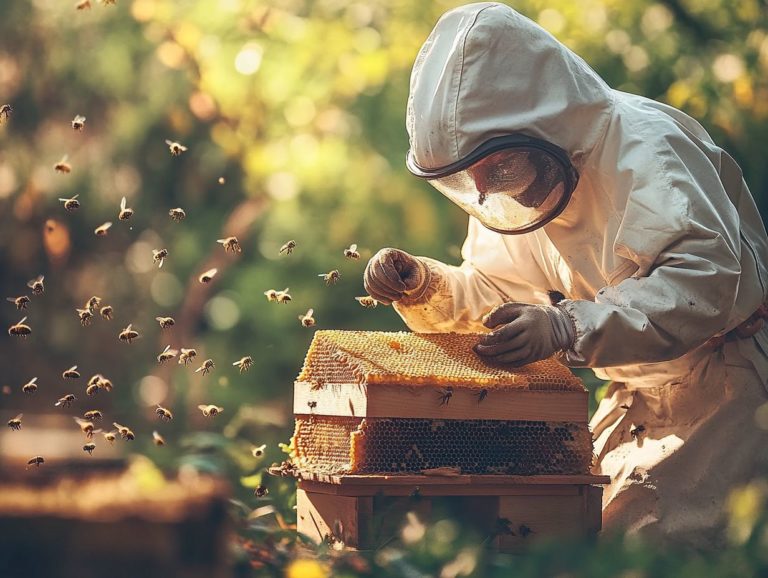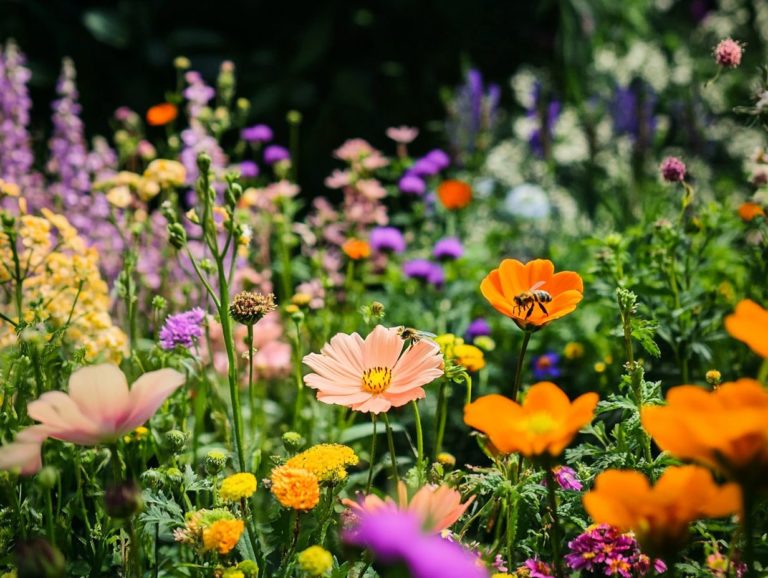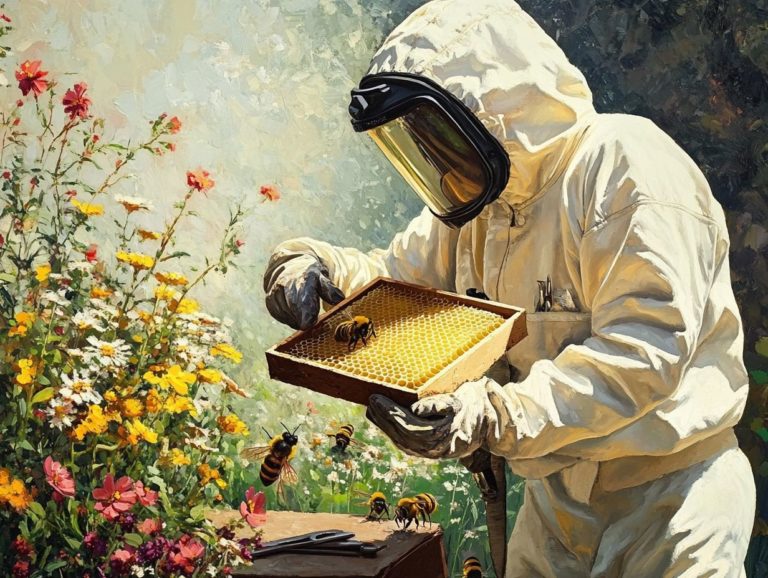The Connection Between Nutrition and Hive Management
Effective hive management is predicated on your understanding of the crucial role nutrition plays in sustaining bee health and productivity. Recognizing the significance of honey bee nutrition can help prevent issues such as chronic hive problems.
Feeding your bees the right nutrients can transform their health! Proper nutrition not only supports the well-being of your bees but also enhances their capacity to thrive and produce honey. Dietary adjustments, such as incorporating antioxidants and selenium from foods like Brazil nuts, can boost their health.
In this article, you’ll discover the essential nutrients bees require, practical strategies to ensure they receive the right diet, and key indicators of nutritional deficiencies to monitor. Understanding dietary triggers and food allergies can also inform your hive management practices.
Equip yourself with the knowledge to optimize your hive management practices, fostering healthier and more resilient bees. Insights from the Honey Bee Nutrition Guide by Mississippi State University and the Honey Bee Health Coalition can be invaluable.
Contents
- Key Takeaways:
- What is Hive Management?
- Why is Nutrition Important for Hive Management?
- How to Provide Proper Nutrition for Bees?
- What are the Signs of Poor Nutrition in Honey Bees?
- How to Address Nutritional Deficiencies in a Hive?
- What Other Factors Can Affect Hive Management?
- Frequently Asked Questions
- What is the connection between nutrition and hive management?
- Why is nutrition important in hive management?
- What are some key nutrients for a healthy hive?
- How can beekeepers ensure their hives are receiving proper nutrition?
- What happens if a hive is not receiving enough nutrition?
- Are there any specific nutritional requirements for different stages of a bee’s life?
Key Takeaways:
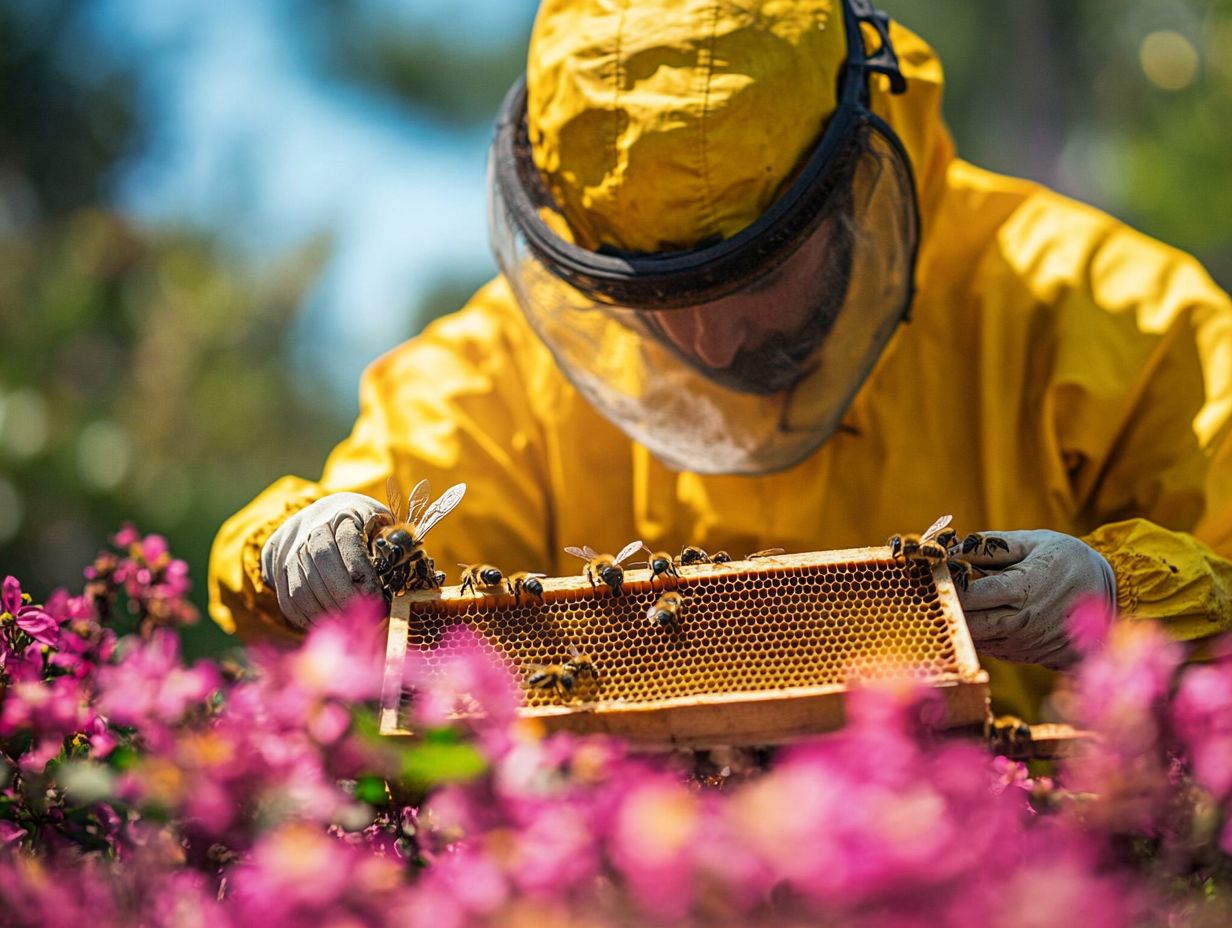
- Proper nutrition is crucial for maintaining healthy and productive bee colonies, as evidenced by meta-analysis studies.
- Providing a diverse range of flowers, supplements, and clean water sources can help ensure bees receive the necessary nutrients. Supplemental feeding practices are especially important during food scarcity.
- Poor nutrition can lead to reduced honey production and higher vulnerability to pests and diseases like Nosema and Varroa mites.
What is Hive Management?
Hive management is an essential practice that revolves around ensuring the health and productivity of honey bee colonies, especially those of the common honey bee species, Apis mellifera. Effective hive management also involves addressing issues like chronic hive problems and food allergy management.
To excel in hive management, you must grasp the needed nutrients for bees, vigilantly monitor for signs of stress, and deploy effective strategies to tackle issues like internal swelling, chronic hive management, and potential allergic reactions.
This comprehensive approach not only boosts honey production but also supports the overall well-being of the hive, allowing the bees to thrive in their environment.
By acknowledging the significance of lifestyle changes and dietary adjustments, such as adhering to a histamine diet, you can cultivate a healthier hive ecosystem.
Why is Nutrition Important for Hive Management?
Nutrition is paramount in hive management, significantly influencing both the health and productivity of honey bees. By providing a well-balanced diet, you ensure that your bees receive the essential nutrients they need to thrive, which, in turn, promotes better brood production and boosts their immunity against diseases.
Understanding dietary triggers and potential food allergies that may impact bee health allows you to customize your feeding strategies to meet the unique needs of your colonies. Ultimately, proper nutrition is vital for sustaining hive vitality and maximizing overall hive productivity.
How Does Nutrition Affect Bee Health?
Nutrition is a fundamental factor influencing bee health. It significantly impacts their growth, reproduction, and disease resistance.
By providing a balanced diet rich in important nutrients, you help maintain healthy thyroid function, which contributes to the overall vitality of the hive. When nutrition is lacking, chronic hive symptoms can arise, such as itchy welts and internal swelling, which compromise the bees’ ability to thrive. Ensuring that bees have access to diverse floral sources and supplemental feeding can effectively mitigate these health issues. Chronic idiopathic urticaria, a type of skin condition that can affect bees, highlights the importance of proper nutrition and management.
The variety and quality of pollen and nectar play a direct role in enhancing the immune system of bees. This boosts their ability to fend off pathogens and parasites like Nosema and Varroa mites. A well-nourished bee colony will exhibit increased productivity, characterized by improved foraging efficiency and higher honey yields.
Nutritional diversity provides bees with the necessary tools to cope with environmental stressors, such as climate change and habitat loss, ensuring their resilience in an ever-changing ecosystem.
These factors highlight the critical importance of understanding nutrition’s role in sustaining healthy bee populations, which in turn supports global agriculture. Effective food allergy management strategies can further enhance the overall health of bee colonies.
What Nutrients Do Bees Need?
Bees require a diverse range of nutrients to maintain their optimal health and productivity. Key nutrients include carbohydrates for energy, proteins for growth and development, and essential vitamins and minerals like antioxidants and selenium to combat oxidative stress.
Ensuring a balanced intake of these nutrients is crucial for supporting their immune systems and promoting healthy hive function. Without these essentials, bees may suffer from chronic hives or other health-related issues, ultimately affecting their foraging abilities and overall vitality.
These industrious insects primarily derive carbohydrates from nectar and honey, which are vital energy sources. Proteins come mainly from pollen, crucial for brood rearing and overall hive growth. Vitamins can be sourced from various food items, influencing metabolic processes and bolstering resilience against disease.
Supplements like probiotics and corticosteroids can also aid in managing their health. Don t underestimate the importance of essential minerals, such as calcium and magnesium; they often fly under the radar yet play critical roles in enzymatic reactions, which are chemical processes that help in digestion and nutrient absorption, and overall hive health.
For the colony’s well-being, it s essential to ensure that these vital nutrients are effectively sourced and well-balanced within the hive s diet.
How to Provide Proper Nutrition for Bees?
Providing the right nutrition for bees is essential for their thriving health and productivity! This requires a thoughtful blend of natural forage and supplemental feeding.
By planting a diverse array of flowers that bloom at various times, you can enhance the nutritional intake of your colonies, providing them with a steady food supply throughout the blooming season. Consulting resources like the Honey Bee Nutrition Guide can be instrumental in planning a balanced diet.
Consider dietary adjustments, such as introducing sugar syrup or protein patties, as these are crucial during food shortages and can make a real difference for your bees! Embracing these practices is fundamental to effective hive management and significantly contributes to the overall health of honey bees.
1. Planting a Diverse Range of Flowers
Planting a diverse range of flowers is essential for ensuring that bees have access to a variety of food sources throughout the growing season. A thoughtfully designed garden can provide bees with the essential nutrients they need, including nectar and pollen, which are critical for their health and productivity. Avoid certain foods that might trigger allergic reactions in bees, ensuring a safe and nourishing environment.
By incorporating a mix of native and pollen-rich plants, you can support foraging behaviors. This diversity not only fosters a healthier hive but also contributes positively to the overall ecology of your area.
To create an inviting environment, consider the timing of blooms to ensure that flowers flourish from early spring through late fall. Some excellent choices include lavender, sunflowers, and clover, which not only attract foraging bees but also add vibrant colors to your landscape.
Selecting plants that bloom at different times allows for a continuous food source, enabling honey bees to gather fresh supplies throughout the seasons.
By planning strategically, you can cultivate a bee-friendly landscape that enhances local biodiversity while also satisfying the appetites of these essential pollinators. Make your garden a bee paradise!
2. Using Supplements and Feeders
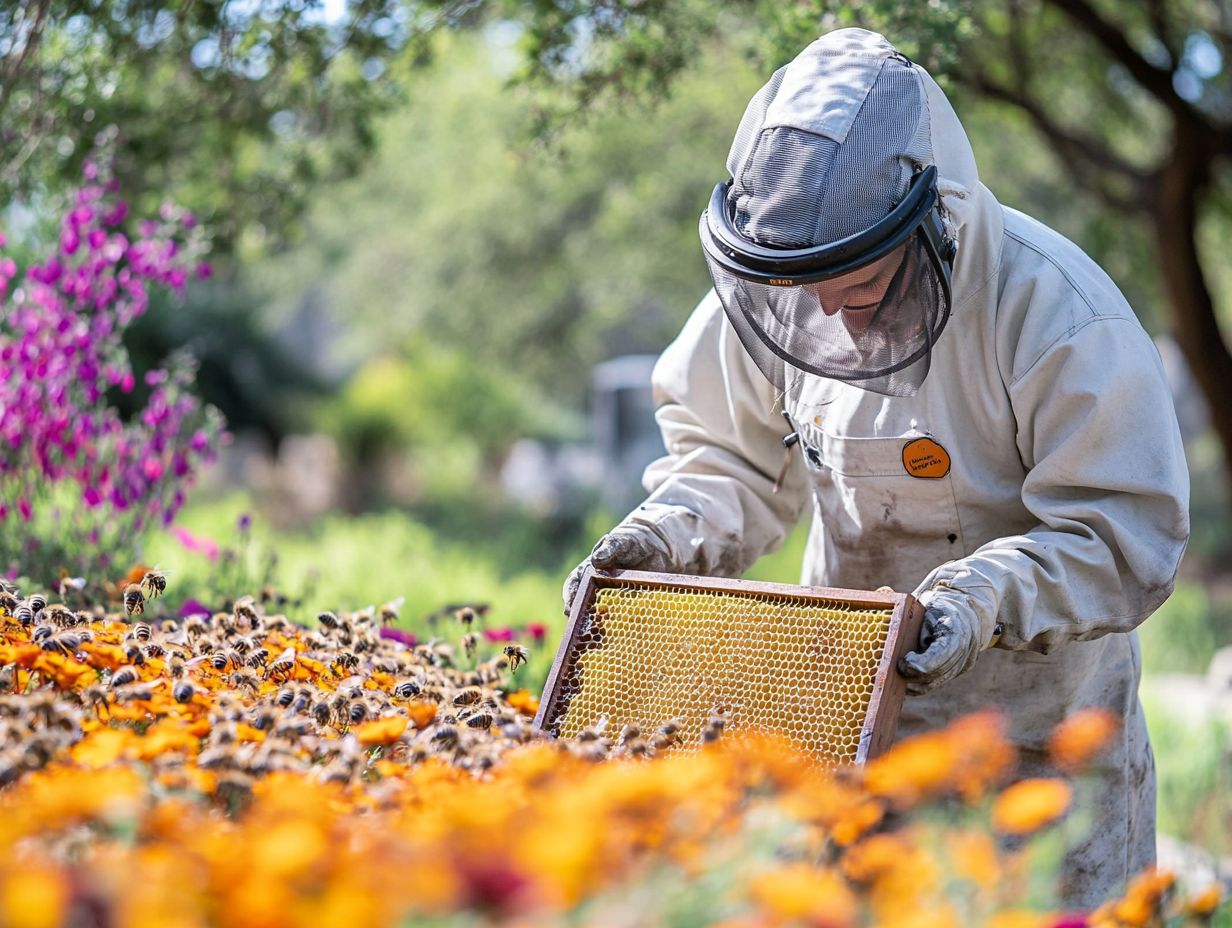
Utilizing supplements and feeders is a great way for providing your bees with the extra nutrients they need, especially during those challenging times when natural forage is scarce. Offering supplements like protein patties and sugar syrup can greatly improve what your honey bees eat, helping them build resilience against diseases and promoting overall hive health.
It’s essential to place feeders thoughtfully to minimize competition among the bees, ensuring that every individual has access to these crucial resources. Beneficial bacteria (probiotics) can also be a valuable supplement to support bee health.
Along with these supplements, consider incorporating patties rich in essential vitamins and minerals to further enhance the nutritional intake of your colonies. Specialized feeders can accommodate not just liquids but also solid food sources like dry sugar or pollen substitutes, catering to various needs as the seasons change.
Supplemental feeding is very important; it can greatly alleviate stress on bee populations during tough periods, ultimately leading to stronger hives. By strategically utilizing these resources, you can elevate the health and productivity of your bees, creating a ripple effect of benefits that positively impacts the entire ecosystem. Effective allergen management in these supplements is crucial to prevent allergic reactions.
3. Providing Clean Water Sources
Providing clean water sources is vital for your hive management and plays a direct role in the health and productivity of your bees. They need water for various purposes hydration, diluting honey, and even cooling the hive. Ensuring clean water is available can help prevent serious allergic reactions that can arise from contaminated sources.
By ensuring that accessible and clean water sources are readily available, you support the foraging behavior of your bees. This simple step greatly improves your colony’s health.
Moreover, establishing a variety of water sources, such as shallow dishes, ponds, or specially designed bee waterers, can further promote the well-being of these essential pollinators. It s crucial to keep these water sources clean and free from contaminants since polluted water can lead to diseases that threaten the entire hive. Corticosteroids may be needed to manage any adverse reactions from contaminated water sources.
Don’t wait ensure your bees have fresh water sources today! When your bees have consistent access to fresh water, their foraging efforts become more focused and productive, resulting in better colony growth and increased honey yield. By prioritizing hydration, you not only enhance your bees nutrition but also cultivate a more harmonious hive environment, ultimately benefiting both the bees and your honey production.
What are the Signs of Poor Nutrition in Honey Bees?
Recognizing the signs of poor nutrition in your honey bees is crucial for effective hive management, giving you the power to take timely action and address any health issues that may arise.
Symptoms like reduced brood production, a rise in chronic hives, and overall lethargy among your honey bees signal that the nutritional needs of your colony are not being adequately met.
By monitoring these indicators, you can make the necessary dietary adjustments to ensure that your hives thrive and remain productive.
1. Reduced Brood Production
Reduced brood production serves as a critical indicator of poor nutrition in honey bees, signaling that the colony may not be receiving the essential nutrients necessary for optimal growth and development. When honey bees lack adequate food sources, the queen might lay fewer eggs, leading to a decline in the overall population and vitality of the hive.
Act quickly to fix nutritional deficiencies and watch your bees thrive! Evaluating brood health starts with assessing both the size and quality of the brood pattern. As a beekeeper, you should look for signs like the uniformity in brood cell capping and the presence of healthy larvae. If you observe uneven brood, it may suggest nutritional imbalances.
To enhance conditions, consider supplementing with high-quality protein sources, such as pollen patties, and ensure there is a sufficient carbohydrate supply through sugar syrup or honey reserves during lean periods.
Implement diverse forage planting and regularly monitor hive conditions to further support a balanced diet, which is vital for the colony s resurgence and overall vitality.
2. Decreased Honey Production
Decreased honey production can be a telling sign of inadequate nutrition among honey bees, reflecting the overall health and efficiency of your hive. When honey bees don t receive the necessary nutrients, they may struggle to forage effectively, leading to lower honey yields and diminished colony strength.
It s essential for you, as a beekeeper, to monitor honey production trends and assess nutritional input to ensure your hives are thriving and positioned to meet their production goals.
The nutritional profile of honey bees plays a pivotal role in their ability to produce honey, with several key factors significantly influencing these yields. For example, the availability of diverse floral sources rich in carbohydrates, proteins, vitamins, and minerals directly affects a hive’s productivity. Additionally, environmental conditions like weather patterns and local flora diversity are crucial for optimal foraging.
Here are some effective strategies to enhance honey production:
- Supplement feed with high-quality protein sources during dearth periods,
- Ensure an ample water supply,
- Plant nectar-rich plants that provide your pollinators with a steady nutritional flow.
By focusing on proper nutrition management, you can start cultivating stronger colonies today for maximum honey yield.
3. Increased Susceptibility to Pests and Diseases
Increased susceptibility to pests and diseases is a crucial indicator of poor nutrition in honey bees. A well-nourished colony is far better equipped to fend off threats. When honey bees face nutritional deficiencies, their immune systems can take a hit, making them more vulnerable to diseases and pest infestations, which can lead to chronic hive issues or even colony collapse.
Therefore, ensuring that your honey bees receive a balanced diet is essential for building their resilience against these challenges. This balanced diet primarily consists of nectar and pollen, which provide essential proteins, lipids, vitamins, and minerals.
When you grasp the significance of these nutrients, you can adopt strategies such as offering supplementary feeding during lean periods or planting a diverse array of floral resources nearby.
Monitoring hive health and being proactive about disease management can significantly enhance the colony’s ability to withstand environmental stressors. By fostering a nutrient-rich environment, you can substantially reduce the risks associated with pests like Varroa mites, a common pest that affects honey bee colonies, and diseases such as American foulbrood, ultimately promoting the overall vitality of your hive.
How to Address Nutritional Deficiencies in a Hive?
Addressing nutritional deficiencies in your hive is essential for the health and productivity of honey bee colonies. A proactive approach includes regularly evaluating the nutritional status of your hives and identifying deficiencies that may be impacting bee health.
Making dietary adjustments, such as offering supplemental feeding and enhancing forage diversity, can substantially elevate overall hive conditions and vitality. By implementing these strategies, you can rejuvenate the health of your colonies and foster effective hive management.
1. Identifying the Specific Deficiency
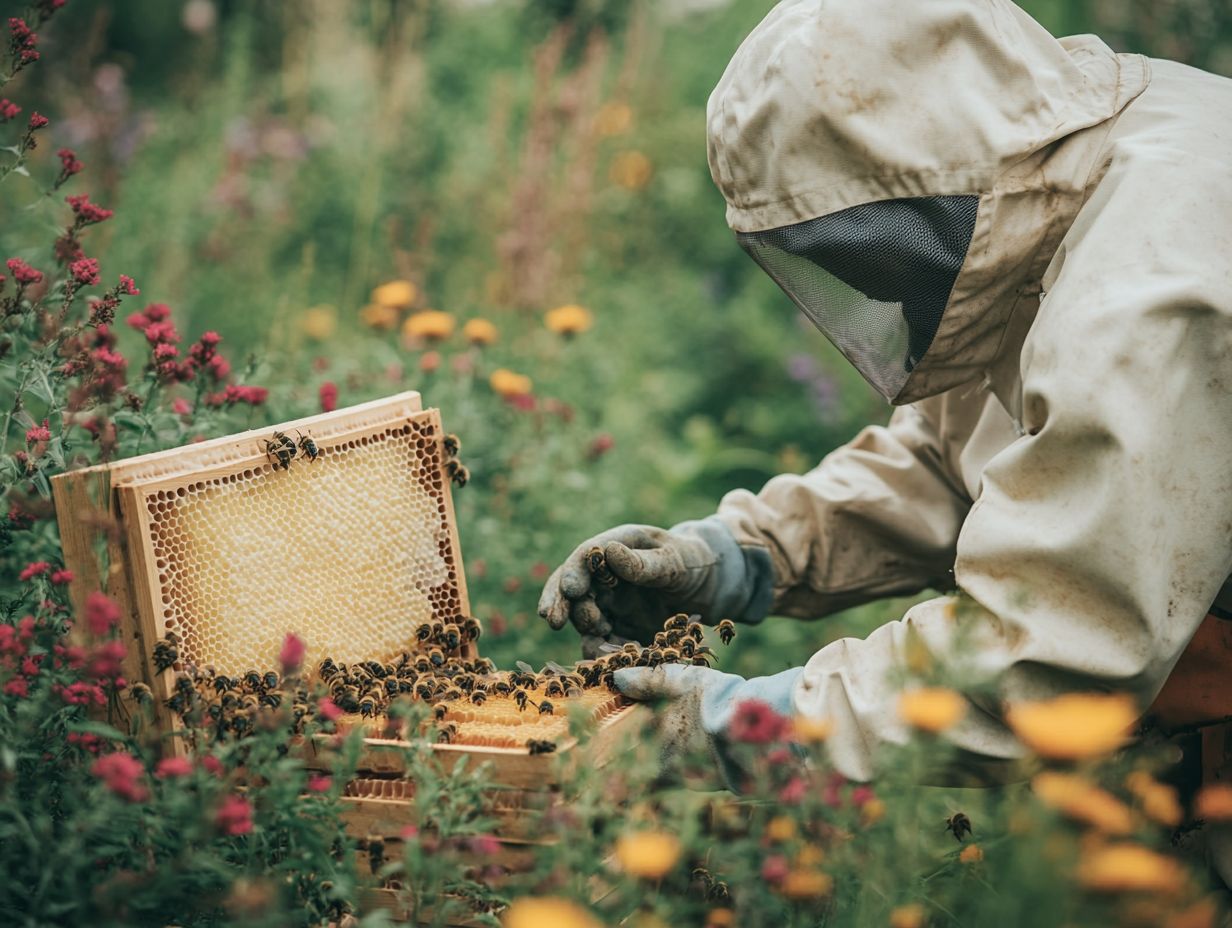
Identifying the specific nutritional deficiencies affecting your hive is the crucial first step in tackling health issues and using good beekeeping practices. Look for signs such as reduced brood production or increased susceptibility to diseases to pinpoint where dietary adjustments are necessary.
Conducting thorough assessments and monitoring bee behavior will provide valuable insights into the nutritional needs of your colonies. This process can be enhanced through observational techniques, like keeping an eye out for abnormal bee activity or examining the quantity and quality of foraged pollen.
You can also conduct systematic testing by sampling hive food sources and analyzing pollen for essential nutrients such as proteins, lipids, and carbohydrates. Using lab tests lets you quickly find deficiencies, so your bees can thrive!
By combining these methods, you ll be able to proactively support your bees’ health and productivity, ultimately ensuring a thriving hive.
2. Adjusting Feeding Practices
Adjusting your feeding practices is crucial for tackling nutritional deficiencies and ensuring the health of your honey bee colonies. Implement targeted feeding strategies by offering supplements like protein patties and sugar syrup to support your bees dietary needs during critical times.
Regularly reviewing and modifying your feeding practices based on hive conditions and seasonal changes is vital for maintaining optimal nutrition and productivity in your hives. Exploring various supplemental feeding methods can significantly enhance the well-being of your colonies.
For example, when natural pollen sources are running low, consider introducing high-quality protein patties to boost your bees’ protein intake. You can also adjust the sugar syrup concentration to meet the specific energy requirements of the hive, especially during crucial phases like pre-swarming or right after a honey harvest.
By closely observing your hive’s behavior and weight, you can gather essential clues about its nutritional status, allowing for timely interventions that promote longevity and a thriving honey production cycle.
3. Consulting with a Beekeeping Expert
Consulting with a beekeeping expert can unlock valuable insights and guidance for tackling nutritional deficiencies in your hives. These specialists can help you assess your hive conditions, recommend suitable feeding practices, and suggest strategies to enhance the overall health of your bees.
By collaborating with professionals in the field, you can achieve more effective hive management and enjoy better outcomes for your honey bee colonies. Leveraging their extensive knowledge, these experts provide tailored advice on managing hive stressors and optimizing the environment for your pollinators.
They can identify specific nutritional gaps by analyzing pollen sources and offer solutions that enrich the dietary offerings for your bees. Beekeeping experts can introduce innovative hive management techniques, including seasonal management and pest control strategies, ensuring your hives remain productive and resilient.
Engaging with these professionals gives you the power to foster a more sustainable and thriving beekeeping practice that benefits both your bees and the broader ecosystem. Start assessing your hive today to ensure your bees are healthy and productive!
What Other Factors Can Affect Hive Management?
Several factors can significantly influence your hive management beyond just nutrition. Climate conditions, pest pressures, and hive hygiene practices all play crucial roles. Understanding the interplay of these elements with bee health is essential for maintaining productive colonies.
Extreme weather events limit foraging opportunities. Neglecting hive hygiene increases disease susceptibility. By proactively managing these factors, you can foster a more stable environment for your honey bee colonies, ensuring their health and productivity thrive. Proper honey bee nutrition is also crucial for maintaining their well-being.
1. Climate and Weather
Climate and weather are pivotal in your hive management, directly influencing the availability of forage and the overall health of your honey bee colonies. Variations in temperature, rainfall, and seasonal patterns can profoundly affect bee foraging behaviors and the nutritional resources your hives rely on.
It’s essential to stay alert to these environmental changes, allowing you to adjust your management strategies and ensure optimal bee health. For example, during certain seasons, supplemental feeding may be necessary to maintain hive strength.
When extreme weather events occur like prolonged droughts or unseasonably cold temperatures you may notice reduced flowering periods, which limits the food sources that your bees depend on for survival. During such adverse conditions, you may struggle to maintain hive strength. To counter these effects, consider strategies such as supplemental feeding or relocating your hives to more favorable foraging areas.
By understanding local climate patterns and forecasts, you can better anticipate changes, enabling you to implement proactive measures. Incorporating data on climatic shifts into your beekeeping practices not only enhances resilience against unpredictable weather but also promotes healthier colonies and improves honey production.
2. Pesticide Use and Its Impacts
Pesticide use is a crucial factor to consider in hive management, as exposure to specific chemicals can negatively impact bee health and lead to issues such as chronic health problems in bee colonies and allergic reactions. As a beekeeper, you must be informed about the types of pesticides applied in your area. Your bees depend on it!
Implement integrated pest management strategies to manage agricultural pests effectively while providing a safeguard for honey bees by reducing the incidence of triggers for chronic health problems.
By staying attuned to local pesticide application schedules and working collaboratively with farmers to select bee-friendly alternatives, you can foster a safer environment for your hives. Understanding the ecological effects of chemical use is crucial. It benefits not only the bees but the entire ecosystem. This awareness can also help in understanding how food allergies and other health issues like chronic idiopathic urticaria may arise from environmental exposures.
Employing natural pest control methods, such as introducing beneficial insects and promoting biodiversity, further reduces dependence on harmful chemicals. These strategies are essential in preserving bee populations, which play a critical role in pollination and maintaining food security around the globe. For example, probiotics beneficial bacteria that can enhance bee health can be introduced.
How will you adapt your management practices in response to changing weather?
3. Hive Hygiene and Health
Maintaining proper hive hygiene is essential for promoting bee health and preventing the spread of pests and diseases within your colonies. Regular inspections and cleaning the hive environment help eliminate contamination sources, creating a healthier living space for your bees. Prioritizing hive hygiene significantly reduces risks associated with poor management practices and enhances the overall resilience of your hives. This is similar to how maintaining healthy thyroid function aids overall human health.
Adopting best practices, such as removing old comb, managing excess moisture, and ensuring proper ventilation, plays a crucial role in supporting your colony’s well-being. Implementing strict safety practices, like using designated tools for each hive and being cautious with hive movement, helps minimize exposure to pathogens. Just as allergist Dylan Timberlake advises on avoiding allergens to manage food allergy symptoms, these practices are vital for your bees.
Learning about common diseases, such as Varroa mite infestations and American foulbrood, empowers you to protect your bees effectively. Ultimately, investing your time in proper hive management nurtures healthier bees and leads to more productive honey harvests. Don t wait refer to resources like the Honey Bee Nutrition Guide by Mississippi State University for detailed guidance on honey bee nutrition.
Frequently Asked Questions
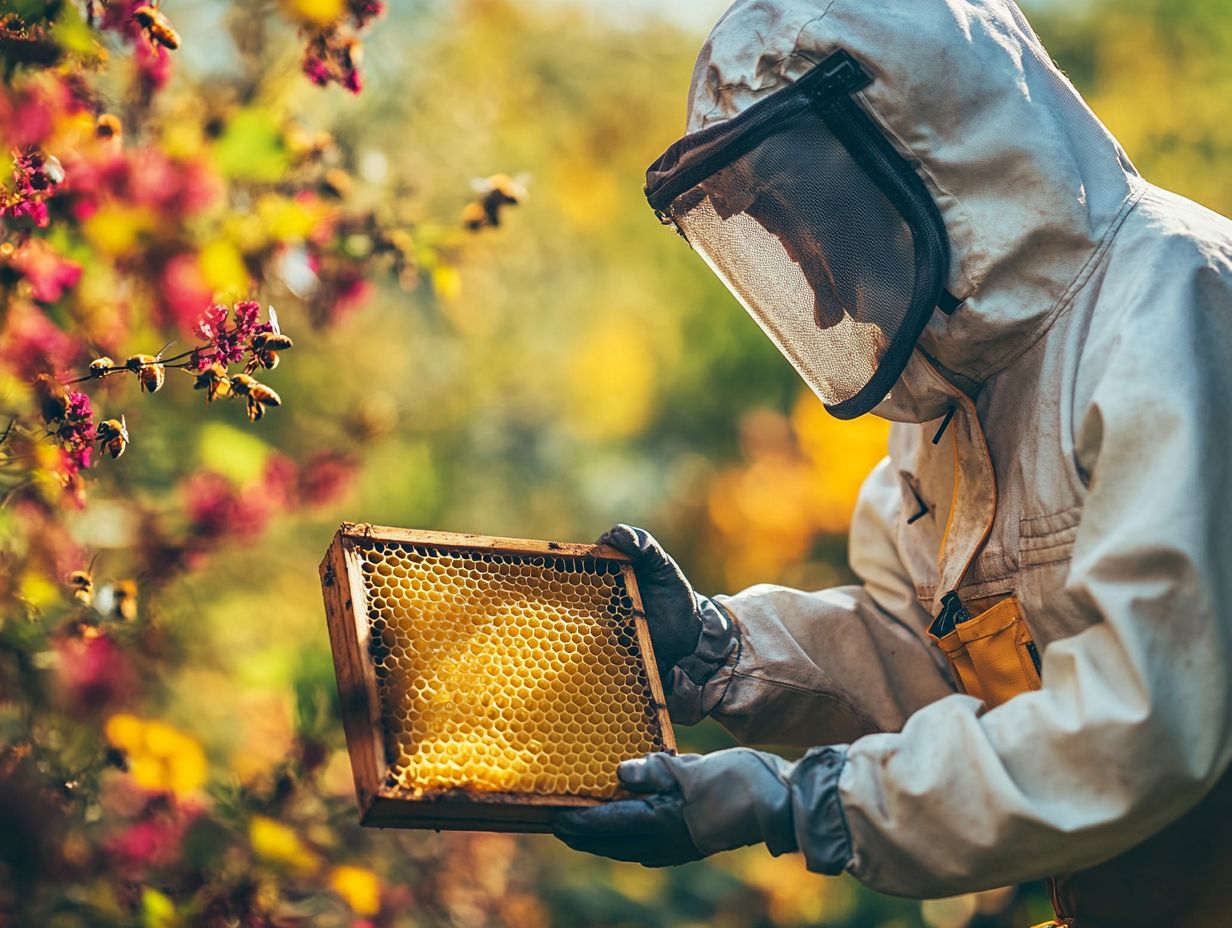
What is the connection between nutrition and hive management?
The connection between nutrition and hive management refers to how the food sources and diet of bees impact the health and productivity of a bee colony. Proper nutrition is crucial for hive well-being and plays a key role in a successful beekeeping operation. Unbalanced nutrition can lead to issues like chronic hives or allergic reactions in bees, much like humans face food allergy management challenges.
Why is nutrition important in hive management?
Nutrition is vital in hive management because it directly affects the health and productivity of bees. A well-nourished hive is more disease-resistant, can produce more honey, and has a stronger immune system to withstand environmental stressors. Just as humans need a balanced diet with key nutrients like selenium and antioxidants for healthy thyroid function, bees require a variety of nutrients to thrive.
What are some key nutrients for a healthy hive?
Honey bees require a balanced diet of carbohydrates, proteins, vitamins, minerals, and water. Key nutrients for a healthy hive include pollen, nectar, and water sources, along with supplements like sugar syrup or protein patties. In addition to nectar from flowers, bees benefit from other sources of vitamins and minerals, such as Brazil nuts, which are high in selenium.
How can beekeepers ensure their hives are receiving proper nutrition?
Beekeepers can ensure their hives receive proper nutrition by providing diverse food sources, avoiding pesticides and chemicals, and regularly monitoring the health and behavior of their bees. Supplementing their diet during times of low food availability is also essential. This is similar to how humans might follow a histamine diet or make other dietary adjustments to manage health conditions.
What happens if a hive is not receiving enough nutrition?
If a hive is not receiving enough nutrition, it can lead to a weak and vulnerable colony. Bees may become more susceptible to diseases and pests, have a reduced ability to produce honey, and experience a shorter lifespan. In severe cases, the hive may collapse. This situation is akin to how humans can develop chronic idiopathic urticaria or internal swelling without proper food allergy management.
Are there any specific nutritional requirements for different stages of a bee’s life?
Yes, bees have specific nutritional needs at different life stages. Young bees require more protein for growth.
Older bees need more carbohydrates. This provides them with the energy they require.
The queen bee has unique nutritional needs, especially for egg production. A varied diet is crucial for the hive s health.
Research, including comprehensive studies that analyze multiple research works, shows that a diverse diet leads to better health outcomes. Just like humans thrive on varied diets rich in antioxidants, bees also flourish with diverse nutrition!

